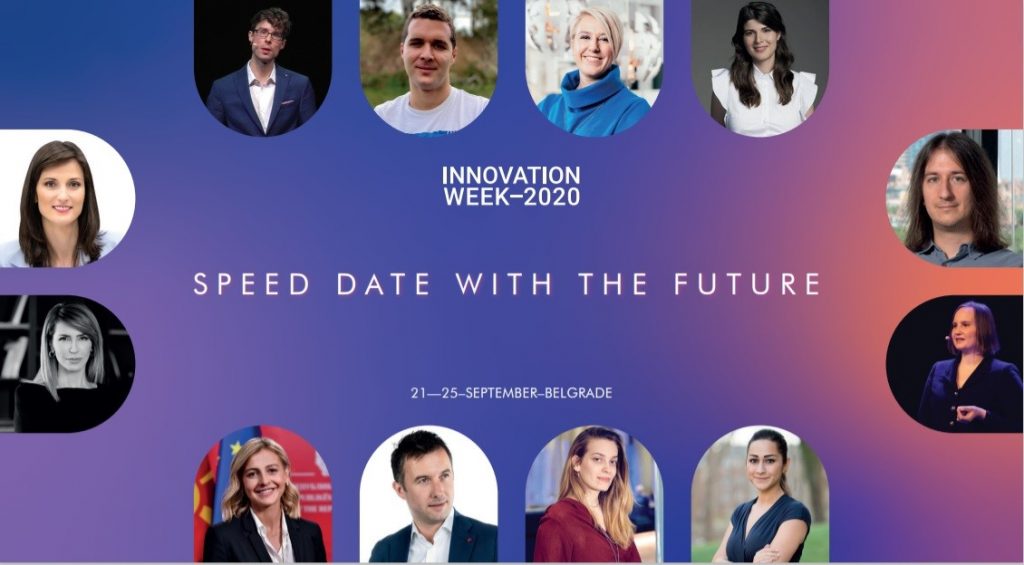Text by: Žaklina Nikolić-Kušić, Founder and Program Director of Innovation Week
Innovation is a “massive collective effort” (Mariana Mazzucato). It is also a “team sport” and it is needed to create national innovative ecosystems and encourage and acknowledge thousands of trial-and-error experiments, since innovation is not about one eureka moment.

The best way to explain what innovation does is to compare a life of an American men in 1900s who usually started to work on average at the age of 14, used to spend 25% of his life in backbreaking work and died at the age of 47. This man’s modern equivalent man spends half of his time in education or retirement works just 10% of his “hours on earth” and dies at the age of 80. The mentioned change is almost entirely due to the “wonders of innovation”, as journalist Matt Ridley points out in his book “How innovation works “.
In our era of disruptive technology innovations, that improve the quality of our lives, one of the paramount challenges is to further extend healthy life span and slowing down aging.
“Can Google solve death? “was the astonishing Time’s cover page in 2013 when “Alphabet” company was launched, with the mission to help people live healthier and longer lives. The first baby who has been born last year could live to be 142 years old. Possibility that we live on a verge of “eternal life” discovery due to longevity technology are best expressed in former president of Google Ventures Bill Maris’s words “I just hope to live long enough not to die “.
Innovation is an extremely powerful force for positive change and the main driving force for the economy and society progress and people’s wellbeing, but also trigger for economic divide and inequality, which will be translated, for the first time in history, from economic to biological inequality, says Yuval Noah Harari, historian and futurologist.
“One of the most difficult and demanding challenges of our times will be how to protect vital society interests without restrain and stifling innovation, assessing their impact on the future more accurately”
One of the most difficult and demanding challenges of our times will be how to protect vital society interests without restrain and stifling innovation, assessing their impact on the future more accurately. Covid 19 pandemic, a new urgent grand global challenge, accelerated global digital transformations of economy and society in all aspects, from education, healthcare, retail, transport, changing radically the way we work, connect, live. Internet has become “the cornerstone of the global economy “according to James Ball (“The System”) but also critical global infrastructure, used by half of world’s population through 25bn-30bn connected devices. Internet as revolutionary technology encourage a new wave of radical innovations in almost every field, but due to astonishing rapid growth left unchecked and unregulated, it is turning also into an instrument of control and monopoly of few big companies. Professor Shosana Zubbof in her book called “The age of Surveillance “ explains how human experience data has been misused as free raw material for translation into behavioural data and fabricated not just into prediction products -anticipate what you will do now, soon, and later traded in a new kind of marketplace for behavioural predictions, but also shape our behaviour at scale -behavioural modification.
Governments, regulators and civil organisations have an essential roll, responsibility and a legitimate right to follow more strictly how some innovations are used and their overall impact and implication on economy, environment, society and humanity.
Despite the fact that Europe has more software developers than the United States (5.7 million vs 4.4 million) 5 of the world’s leading research institutions, 26 of the world’s top 100 engineering and technology universities, posses 95 percent of the value of luxury brands globally, Europe has been lagging behind China and United States, especially in digital technologies and in areas such as genomics, quantum computing and AI, crucial for the next wave of automatization and productivity growth. China, especially United States, with Silicon Valley the leading innovation and start-up ecosystem, created the new global technology giants in recent decades and group of superstar companies and unicorns, while Innovating at scale has been a challenge for European economies.
United States has a good and proven model for public sector support of innovation at scale, especially through defence and public sector with systematical investment in technology innovation. One of the most often cited example of mission led innovation at scale is the US mission to put a man on the moon by the end of the 1960s, that required more than 20,000 companies and other institutions to work toward a common objective, cross-sector investments, disruptive innovation in aerospace and numerous other sectors, that also generated many unexpected and important spin-offs, inventions to improve flight control, food safety, clothing and hearing aids. To maintain American leadership in space, today thirteen US companies, including Elon Musk’s SpaceX venture, have been partnering with NASA with strategic mission to put a human on Mars by 2040.

According to Professor Mazzucato “A mission, has the power to unite different stakeholders to work together with a joint purpose and inspire broad collaboration between business leaders and public sectors. But according to Professor Mazzucato also adds that ” Societal challenges are complex. More complex than going to the moon, which was mainly a technical feat. To solve those challenges, requires attention to the ways in which socio-economic issues interact with politics and technology, to the need for smart regulation and to the critical feedback processes that take place across the entire innovation chain. It also requires stronger civic engagement. “
“Innovation is a “team sport” and “massive collective effort” (Mariana Mazzucato) and it is needed to create national innovative ecosystems and encourage and acknowledge thousands of trial-and-error experiments, since innovation is not about one eureka moment”
Today’s most urgent global challenges, such as COVID 19, cancer, climate change, healthy oceans, climate-neutral cities, and healthy soil, requires collaborative leadership, public-private partnership and clear, ambitious mission. A recent McKinsey opinion survey in 5 key European countries, showed that European citizens expect business taking the lead on innovation around critical societal challenges such as environmental sustainability, fairness of pay and wealth, training and qualification for future jobs, digital competitiveness, and speed of innovation. Unfortunately, majority of citizens had little or no trust that business will act in the interest of society, so business leaders have opportunities to deliver on this expectation and rebuild public trust. Purpose-led organisation that clearly demonstrate mission, tangible societal benefits, will inspire citizens and generate public support, fostering collaboration within and across industries and with public sector, stimulating innovation at scale for broad benefits to the economy and society.